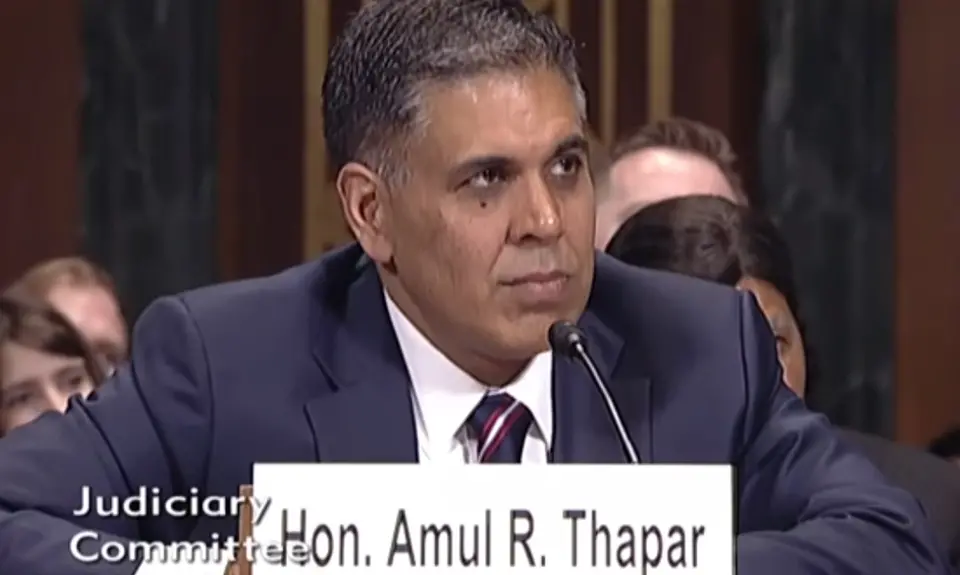“Our Courts, Our Fight” is a blog series documenting the harmful impact of President Trump’s judges on Americans’ rights and liberties and the need for the Senate to confirm President Biden’s federal court nominees to help counteract these effects . Supreme and appellate court cases in the series can be found by issue and by judge at this link.
Even though the issue was not raised by the parties in the appeal, Trump Sixth Circuit judge Amul Thapar reversed a lower court and dismissed a complaint by a college student for violation of his constitutional rights by a federal border agent, ruling that not even US citizens can sue border agents for such deprivations of their constitutional rights. The November 2021 decision was in Elhady v Unidentified CBP Agents.
Anas Elhady, a college student and a US citizen, was driving back to his home in Michigan after visiting friends in Canada. US border patrol agents stopped him for questioning at the border. Without explanation, they forced him to remove his jacket and shoes and put him in a cold cell in “freezing or near-freezing temperatures.” He complained that it was cold and asked for a blanket or return of his other clothes but received no response. He later explained that the cell “got colder” and he began “shivering uncontrollably” and again asked for help, but was told only that he would be “out soon.” In fact, he was kept in the cell for some four hours before he was allowed to leave, and had to be taken to a hospital for treatment. He was never interrogated, and no charges were brought against him.
He later sued several border patrol agents, including lead officer Blake Bradley, contending that they had violated his constitutional due process rights by locking him up for four hours under intolerable conditions and for no good reason. He sought damages under the Supreme Court’s Bivens doctrine, which allows people to sue federal officials for damages for violation of their constitutional rights. The district court granted summary judgment to a number of the officers, but agreed that Bivens did permit Elhady to sue Bradley, ruled that there was enough evidence to show that Bradley had violated Elhady’s rights by ordering his continued detention and exposure to “severe weather and temperatures,” and held that Bradley should not receive qualified immunity.
Bradley appealed only the denial of qualified immunity and did not contest the district court’s ruling on the Bivens issue. Nevertheless, Trump judge Thapar wrote a 2-1 decision that did not even address the qualified immunity issue, reached out and ruled that even a US citizen like Elhady cannot sue a federal border patrol agent for violation of his constitutional rights under Bivens, and sent the case back to the lower court with an order that Elhady’s case be dismissed.
Thapar maintained that the Supreme Court has made clear that liability for unconstitutional conduct under Bivens “does not apply” with respect to conduct by federal border patrol agents at the border, and that district courts should “start and end there.” This was based on the Court’s rejection of possible Bivens liability in the Hernandez case, where a border patrol agent shot across the US-Mexico border and killed a Mexican citizen, and the Ziglar v Abassi case, in which foreign nationals residing illegally in the US were detained in the aftermath of 9/11.
Judge John Rogers, who was nominated by President George W Bush, strongly dissented. He first criticized the majority for violating the usual rule that the court does “not reach forfeited arguments,” like the claim by Bradley in the district court that he could not be sued under Bivens. Bradley’s “Government-provided counsel,” he went on, “explicitly decided not to raise on appeal” that argument, and the Sixth Circuit had previously made clear that “an argument not raised on direct appeal is forfeited.” This principle is especially important in a case like this one, Rogers continued, because it involves a “difficult question” that the Justice Department “repeatedly declined to ask us to address,” even when asked directly at oral argument.
On the merits of the issue, Rogers pointed out that there are “critical factual differences” between this case and the two decisions of the Supreme Court concerning border agents. This case involves the “treatment of a U.S. citizen within the United States” where there were no “national security or foreign relations” ramifications. In contrast, he continued, Hernandez concerned a claim by a “Mexican citizen” who died on “Mexican soil” from a cross-border shooting that had clear “diplomatic” and “foreign relations” implications. And Ziglar concerned “foreign nationals residing illegally” in the US who had “suspected ties to terrorists.” Although he acknowledged that the Supreme Court has recently limited the reach of Bivens liability, Rogers wrote that the Court’s decisions do not lead to the conclusion that “US citizens have no remedy if they are abused within the United States by their own border patrol officials.” Rogers concluded that the district court’s qualified immunity ruling should have been affirmed and the case should have been sent back to the lower court so that Elhady could have received a full trial on his complaint.
As a result of Trump judge Thapar’s decision, however, Anas Elhady will have no opportunity to seek relief for having been intentionally placed in a cell by border agents without a jacket or shoes for some four hours “at freezing or near-freezing temperatures.” Even more troubling, Thapar has created a precedent that will prevent any US citizen from obtaining any relief for constitutional violations by border agents, no matter how serious, throughout the Sixth Circuit in Michigan, Ohio, Kentucky, and Tennessee. This case illustrates the importance, as part of our fight for our courts, of the Senate confirming fair-minded judges who will respect constitutional rights and not jump the gun to reach difficult issues that are not squarely presented by the cases before them.
